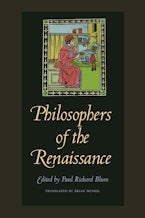- Home
- philosophy
- history
- Philosophy in the Renaissance
Preparing your PDF for download...
There was a problem with your download, please contact the server administrator.
Philosophy in the Renaissance
An Anthology
Edited by Paul Richard Blum and James G. Snyder
Imprint: Catholic University of America Press
The Renaissance was a period of great intellectual change and innovation as philosophers rediscovered the philosophy of classical antiquity and passed it on to the modern age. Renaissance philosophy is distinct both from the medieval scholasticism, based on revelation and authority, and from philosophers of the seventeenth and eighteenth centuries who transformed it into new philosophical systems.
Despite the importance of the Renaissance to the development of philosophy over time, it has remained largely understudied by historians of philosophy and professional philosophers. This anthology aims to correct this by providing scholars and students of philosophy with representative translations of the most important philosophers of the Renaissance. Its purpose is to help readers appreciate philosophy in the Renaissance and its importance in the history of philosophy. The anthology includes translations from philosophers from the thirteenth to the seventeenth centuries, and it ranges from works on moral and political philosophy, to metaphysics, epistemology, and natural philosophy, thereby providing historians and students of philosophy with a sense for the nature, breadth, and complexity of philosophy in the Renaissance. Each translation is accompanied by an introduction by a historian of Renaissance philosophy, as well as select secondary sources, in order to encourage further study.
This anthology is a companion to Philosophers of the Renaissance, edited by Paul Richard Blum and published by Catholic University of America Press in 2010, which included essays on the writings of the same group of philosophers of the Renaissance: Raymond Llull, Gemistos Plethon, George of Trebizond, Basil Bessarion, Lorenzo Valla, Nicholas of Cusa, Leon Battista Alberti, Giovanni Pico della Mirandola, Marsilio Ficino, Pietro Pomponazzi, Niccolò Machiavelli, Heinrich Cornelius Agrippa von Nettesheim, Juan Luis Vives, Philipp Melanchthon, Petrus Ramus, Bernardino Telesio, Jacopo Zabarella, Michel de Montaigne, Francesco Patrizi, Giordano Bruno, Francisco Suàrez, Tommaso Campanella.
Paul Richard Blum is T. J. Higgins, SJ, Chair in Philosophy (emeritus) at Loyola University of Maryland and author or editor of 11 books, including Philosophers of the Renaissance Revised edition (CUA Press, 2010). James Snyder is Associate Professor of Philosophy at Marist College.
"Paul Richard Blum is one of the main experts of Renaissance philosophy globally and to state that his contribution is significant is an understatement. Engaging, simple to understand for a wide audience without missing the precision needed in such a specialized topic. The translations are very readable and to be wholly commended. The volume’s merit is to make difficult authors accessible to a wider public."
~Francesco Borghesi, University of Sydney
"Very useful complement to the volume Philosophers of the Renaissance, edited by Paul Richard Blum and Brian McNeil in 2010, this Anthology presents an original choice of texts, normally not cited in the presentations of specialists, to represent, through the authors' own words, the richness and variety of themes, methods and literary forms that characterize Renaissance philosophical thought. At the same time it offers a very useful aid to university teaching activities, providing professors and students with the textual basis for analysis and discussion, a prelude to desirable subsequent insights. Not to forget, last but not least, the importance of the English translation of the anthologized texts, some of which were originally written in the Italian vernacular, which make them accessible to an international audience."
~Maria Muccillo, University La Sapienza ́of Rome
"P hilosophy in the Renaissance: An Anthology, is a wonderful and superb work that gathers the other famous writings of important men who shaped our culture. Any reader who would like to expose themselves to the Renaissance, understand the Renaissance and its importance to our world today, or just expand their knowledge of Renaissance thinkers, would do well to read this anthology."
~VoegelinView


